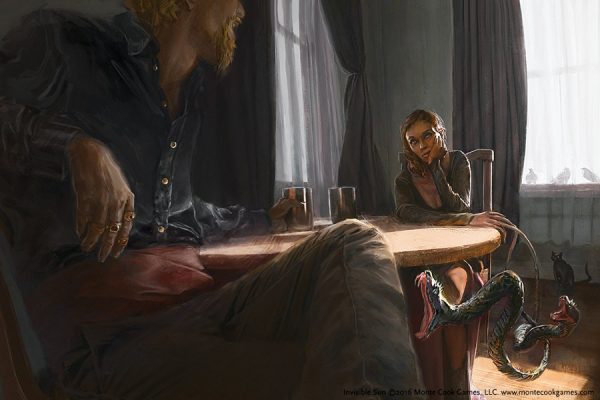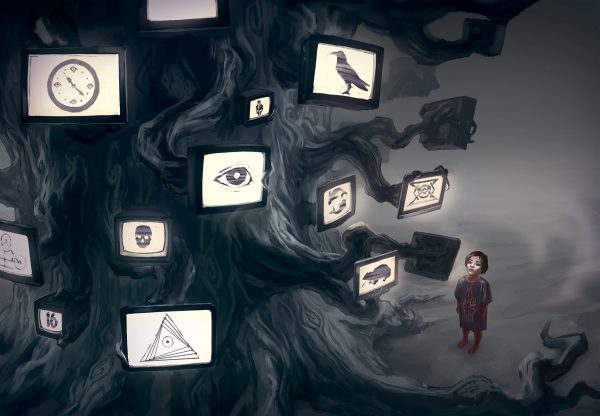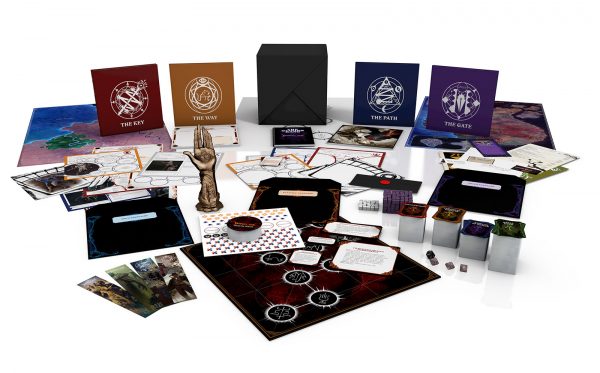
In the classic Disney cartoon, The Sorcerer’s Apprentice, when Mickey gets the magic hat and uses its power, it’s represented by a sort electrical zap. And that’s what most people think of when they think about magic—a zap. “Spells” are just zaps of various kinds. You deliberately use energy and instantaneously you get some kind of effect. It’s brief, it’s dramatic, and it in no way appears normal or natural. You’re consciously bending reality in what’s likely a straightforward and certainly obvious way. And that’s fine. It’s a very traditional take on magic in gaming, certainly.
This has a lot of impact on world building and game design, of course. Let’s say you’re a crafter of fine objects and you also wield magic. In many fantasy worlds and games, if you wanted to use your magic to help your crafting, you’d learn the right zaps to improve or ease your work. That wooden beam that needs to be perfectly straight? Well, give it a go with your tools and if that doesn’t quite work, pull out the right zap and fix it.
But that isn’t the way magic has to be. In Invisible Sun, magic also expresses itself through the actions of the character that wields it. Yes, there are spells (lots of them!) in the game, and they fit the general category of a “zap” that might teleport you, might change your shape, or might ensorcel your foe. But spells are just one aspect of magic. One expression.
The game includes minor magic, charms, and hexes that all do minor things that even an everyday person might find useful. There are incantations, which are like fleeting spells, and there are long-form magical practices that take hours to prepare and perform and involve all sorts of materials, symbols drawn on the floor, candles burning, and all that wonderfully flavorful stuff. The effects of many of these are slower, subtler, and far less likely to be thought of as zaps.

And there’s more. The Order of Makers are characters that create items imbued with magical properties but there are no spells or zaps involved at all. The creative output of a Maker is the result of an entirely different expression of magic. The Maker’s wooden beam isn’t unnaturally straight because they zapped it. It’s unnaturally straight because the Maker’s inherent magic flows through them with every motion while working.
Every player character has a forte, which represents some inherent magical talents, and many of these don’t manifest as zaps either. For example, a character who Channels Strength and Skill calls upon the talents and abilities of others. There’s no zap—this is just a part of them. No deliberate use of energy with an instantaneous effect. Magic just expresses itself as talents and skills that you never trained for in a conventional manner.

It’s also probably worth mentioning that while all PCs (and some NPCs) are vislae and use magic in a variety of ways, there are NPCs called zilats that wield magic in a very specific and singular way. A zilat writer doesn’t cast spells, but their magic makes their words perfectly beautiful every time. A zilat might also have a single extraordinary talent, such as teleporting or casting out unwanted ghosts. They can’t use any other kind of magic, but they’re very good at teleporting, casting out ghosts, or however magic manifests itself in them.
Lastly, let’s not forget the best example of magic without spells in the game, and that’s Sortilege. While characters use their Sorcery pool to use their various magical practices and abilities, every character also has a Sortilege pool. This represents the inherent magic within them that they can use to influence their own actions or the world around them in some way. This is particularly important because sometimes an action can’t succeed without some application of magic (you can’t break down a magically reinforced door with just strength) but a bit of Sortilege turns any action magical, as the magic just flows through you, almost unconsciously.
The point of all this, in a design diary, then, is to simply say that a mostly world building decision like “let’s have magic that expresses itself more than just zaps” informs and shapes the design dramatically. PCs of one order aren’t just like the PCs of another order just with different spells. They wield magic in an entirely different way. The game offers a multitude of different expressions of magic, and they all contribute to making magic in the game more flavorful, more pervasive, more interesting, and more wondrous. In short, they make magic more magical.
Ready to weave, call, cast, and shape magic? Pre-order Invisible Sun now!
